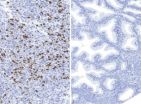LOS ANGELES, CA, March 19, 2013 (Press-News.org) The creators of "Newborn Care 101 - What Parents Need To Know", have announced an update to their DVD and free newborn care information website. The website, www.newborncare101.com, offers a wide variety of information for new parents including SIDS risk and prevention, feeding, vaccinations, colic as well as a popular Frequently Asked Questions section. There is also a downloadable list of what to bring to the hospital when having a newborn and what to have at home for your newborn's arrival.
"Overall, not much changes from year to year with regards to Newborn Care. However, the latest SIDs and vitamin recommendations for your newborn have been added to the DVD packet and website," says Michael Schoenwetter (Dr. Mike), the creator of Newborn Care 101 and a board certified pediatrician in practice for over 15 years. Furthermore, Dr. Mike has given newborn information as a featured guest on the nationally syndicated TV show, The Doctors, quoted in Parents magazine and is the resident pediatrician for the largest baby shower site - Baby Shower 101.
About Newborn Care 101, LLC - www.newborncare101.com, is dedicated to the education of new parents and is the creator of "Newborn Care 101 - What Parents Need to Know" DVD and 12 page guide which include how to choose the right hospital and pediatrician, a newborn care class with a live audience, a baby's first examination and all the common symptoms a newborn may have from head to toe. The DVD and company was founded by veteran pediatricians with over 50 years combined experience.
Updated Newborn Care Information for 2013
Newborn Care 101 has updated its DVD and guide for 2013, providing new parents the most up to date information for their newborn.
2013-03-19
ELSE PRESS RELEASES FROM THIS DATE:
ACE: Stacking the Deck in Our Favor
2013-03-19
Be it laundry detergent, paint, ketchup or salad dressing, even before it leaves the production line, gravity begins tugging at it, trying to separate the mixture into different parts. As products separate, they can become watery or gooey. To combat product collapse and increase shelf life, manufactures use stabilizers.
The Advanced Colloids Experiment (ACE-M-1) is designed to help researchers understand how to optimize stabilizers to extend product shelf life, while also cutting development, production and transportation costs. ACE-M-1 launched to the International ...
Columbia University Medical Center/NY-Presbyterian experts at AAN
2013-03-18
The following research from Columbia University Medical Center and NewYork-Presbyterian Hospital is being presented at the 65th annual meeting of the American Academy of Neurology (AAN), March 16-23, 2013, in San Diego.
For additional information, or to arrange an interview, please contact Karin Eskenazi at 212-342-0508 or ket2116@columbia.edu, or Christina Stolfo at 212-305-5587 or chs9135@nyp.org
ORAL PRESENTATIONS
Deoxypyrimidine Monophosphates Treatment for Thymidine Kinase 2 Deficiency
Authors: Caterina Garone, Beatriz Garcia-Diaz, Valentina Emmanuele, Saba ...
PCa markers improve predictive performance of existing clinical variables
2013-03-18
Milan, 15 March 2013 – A genetic score based on PCa risk-associated single nucleotide polymorphisms (SNPs) is an independent predictor of prostate biopsy outcomes, suggest the results of a new study conducted by a group from the Department of Urology Huashan Hospital, Fudan University in Shanghai, China.
The authors, who relate their findings to the male population in China, also suggest that this score can improve predictive performance of existing clinical variables, especially for patients with a total PSA levels < 20 ng/ml
"Genetic susceptibility to prostate cancer ...
New study: Incidence and mortality of PCa after termination of PSA-based screening
2013-03-18
Milan, 15 March 2013 - Men who participate in biennial PSA based screening have a lower risk of being diagnosed as well as dying from prostate cancer up to 9 years after their last PSA test, according to the results of a new study to be presented at the 28th Annual EAU Congress in Milan
A joint Swedish-UK study aimed to examined the risk of developing prostate cancer after last invitation to screening. This investigation follows up on previous publication from the Göteborg randomized screening trial (part of ERSPC) by the same group which showed that biennial PSA screening ...
ChemCam data abundant at Planetary Conference
2013-03-18
LOS ALAMOS, N.M., March 15, 2013 — Members of the Mars Science Laboratory Curiosity rover ChemCam team will present more than two dozen posters and talks next week during the 44th Lunar and Planetary Science Conference in The Woodlands, Texas.
"ChemCam has performed flawlessly in its first six months, providing more than a gigabyte of exciting new information about the Red Planet," said Los Alamos National Laboratory planetary scientist Roger Wiens, Principal Investigator of the ChemCam Team. "Since Curiosity's successful landing on Mars on August 6, 2012, ChemCam has ...
UK study: Epigenetic changes play a key role in development of chemo resistance in BCa
2013-03-18
Milan, 16 March 2013 - At the 28th Annual EAU Congress currently ongoing in Milan until Tuesday, W. Tan and colleagues presented their study on neoadjuvant cisplatin-based chemotherapy which showed that epigenetic changes are potential key drivers in the development of chemo resistance in bladder cancer.
Neoadjuvant cisplatin-based chemotherapy is recommended for patients with muscle invasive bladder cancer. Cisplatin-based regimes have similar efficacy with complete response in 30% a survival advantage if 16% (HR, 0.84;CI 0.72 to 0.99), wrote Tan of the UCL, Dept. ...
New study points to the aggressive potential of small kidney tumors, advocates treatment
2013-03-18
Milan, 16 March 2013 – Small kidney tumours have an agressive potential and should be treated, according to a the results of a large multicentre study presented at the 28th Annual EAU Congress in Milan.
"Many clinicians regard small renal cell cancer as having a benign biologic behavior and non-operative surveillance protocols are often being used in patients with small renal tumours," write the authors in the findings. "The aim of this large retrospective multi-centre study was to evaluate the prevalence of locally advanced growth and distant metastases in patients with ...
Where, oh where, has the road kill gone?
2013-03-18
Millions of birds die in the US each year as they collide with moving vehicles, but things have been looking up, at least in the case of cliff swallows. Today's swallows are hit less often, thanks to shorter wingspans that may help them take off more quickly and pivot away from passing cars. The findings, reported in the Cell Press journal Current Biology on March 18, show that urban environments can be evolutionary hotspots.
"Evolution is an ongoing process, and all this—roads, SUVs, and all—is part of nature or 'the wild'; they exert selection pressures in a way we ...
Putting the clock in 'cock-a-doodle-doo'
2013-03-18
Of course, roosters crow with the dawn. But are they simply reacting to the environment, or do they really know what time of day it is? Researchers reporting on March 18 in Current Biology, a Cell Press publication, have evidence that puts the clock in "cock-a-doodle-doo" (or "ko-ke-kok-koh," as they say in the research team's native Japan).
"'Cock-a-doodle-doo' symbolizes the break of dawn in many countries," says Takashi Yoshimura of Nagoya University. "But it wasn't clear whether crowing is under the control of a biological clock or is simply a response to external ...
How some prostate tumors resist treatment -- and how it might be fixed
2013-03-18
LA JOLLA, Calif., March 18, 2013 – Hormonal therapies can help control advanced prostate cancer for a time. However, for most men, at some point their prostate cancer eventually stops responding to further hormonal treatment. This stage of the disease is called androgen-insensitive or castration-resistant prostate cancer. In a study published March 18 in Cancer Cell, a team led by researchers at Sanford-Burnham Medical Research Institute (Sanford-Burnham) found a mechanism at play in androgen-insensitive cells that enables them to survive treatment. They discovered that ...
LAST 30 PRESS RELEASES:
Ochsner MD Anderson uses groundbreaking TIL therapy to treat advanced melanoma in adults
A heatshield for ‘never-wet’ surfaces: Rice engineering team repels even near-boiling water with low-cost, scalable coating
Skills from being a birder may change—and benefit—your brain
Waterloo researchers turning plastic waste into vinegar
Measuring the expansion of the universe with cosmic fireworks
How horses whinny: Whistling while singing
US newborn hepatitis B virus vaccination rates
When influencers raise a glass, young viewers want to join them
Exposure to alcohol-related social media content and desire to drink among young adults
Access to dialysis facilities in socioeconomically advantaged and disadvantaged communities
Dietary patterns and indicators of cognitive function
New study shows dry powder inhalers can improve patient outcomes and lower environmental impact
Plant hormone therapy could improve global food security
A new Johns Hopkins Medicine study finds sex and menopause-based differences in presentation of early Lyme disease
Students run ‘bee hotels’ across Canada - DNA reveals who’s checking in
SwRI grows capacity to support manufacture of antidotes to combat nerve agent, pesticide exposure in the U.S.
University of Miami business technology department ranked No. 1 in the nation for research productivity
Researchers build ultra-efficient optical sensors shrinking light to a chip
Why laws named after tragedies win public support
Missing geomagnetic reversals in the geomagnetic reversal history
EPA criminal sanctions align with a county’s wealth, not pollution
“Instead of humans, robots”: fully automated catalyst testing technology developed
Lehigh and Rice universities partner with global industry leaders to revolutionize catastrophe modeling
Engineers sharpen gene-editing tools to target cystic fibrosis
Pets can help older adults’ health & well-being, but may strain budgets too
First evidence of WHO ‘critical priority’ fungal pathogen becoming more deadly when co-infected with tuberculosis
World-first safety guide for public use of AI health chatbots
Women may face heart attack risk with a lower plaque level than men
Proximity to nuclear power plants associated with increased cancer mortality
Women’s risk of major cardiac events emerges at lower coronary plaque burden compared to men
[Press-News.org] Updated Newborn Care Information for 2013Newborn Care 101 has updated its DVD and guide for 2013, providing new parents the most up to date information for their newborn.





